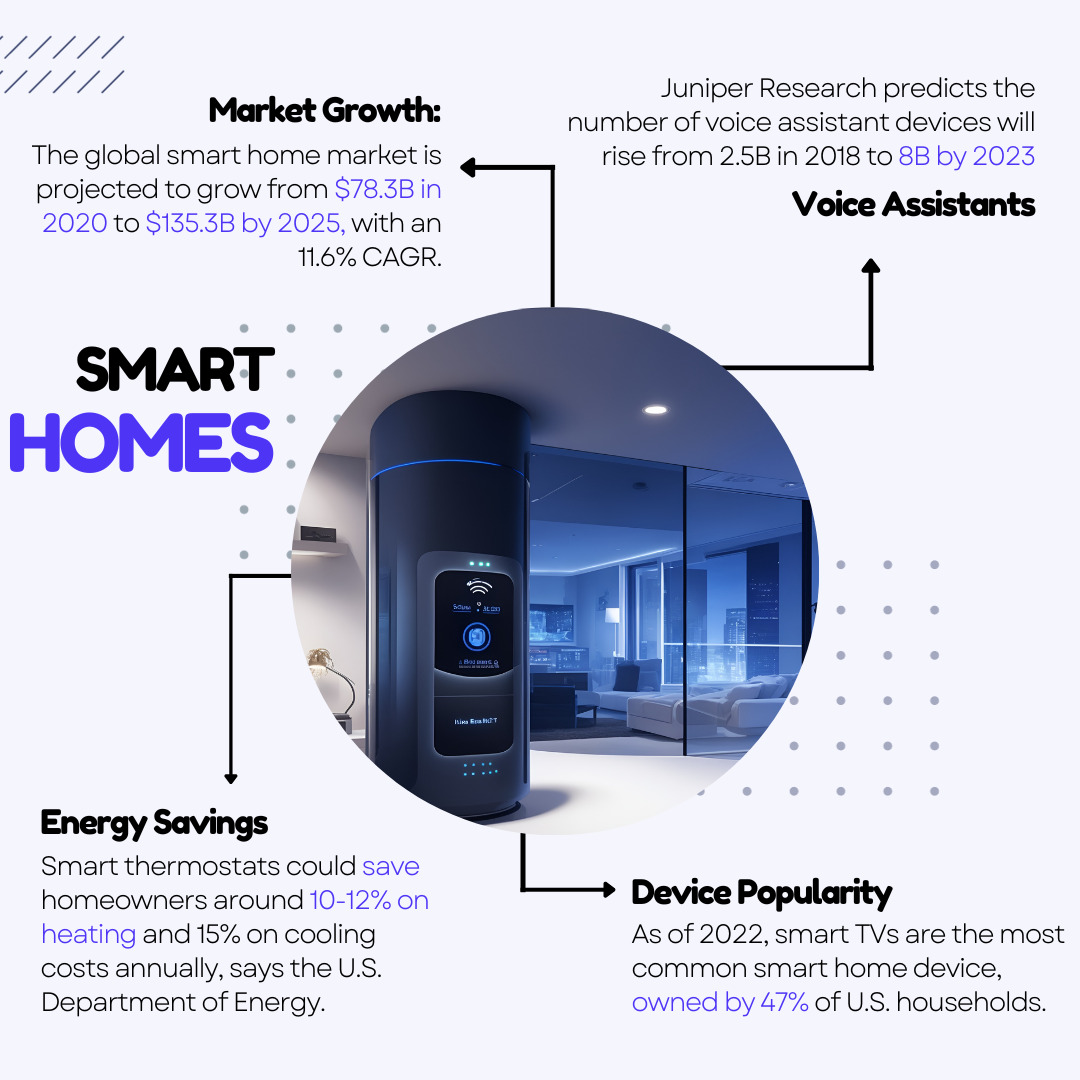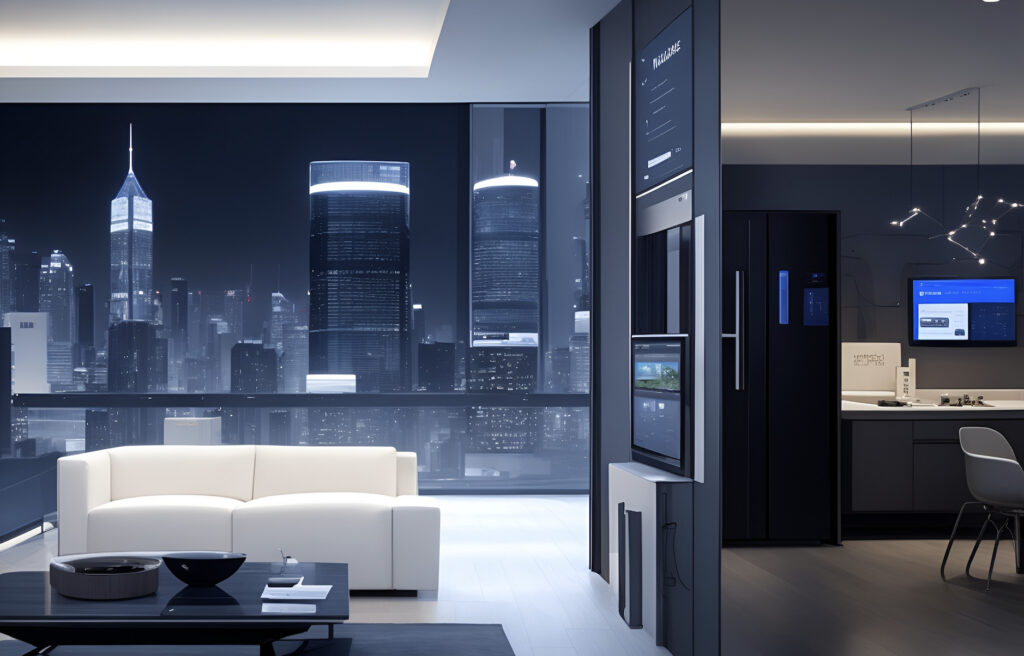Times are changing fast, and more and more renters these days expect some level of smart home technology in the places they live. As someone who manages rental properties, you may be wondering if it’s worth investing in things like smart locks, lighting, appliances etc. for your units.
I totally get the hesitation! Technology can be spendy, and you don’t want to sink money into something that won’t pay off in the long run. But hear me out, because going smart may not be as risky or expensive as you think.
What Exactly is a Smart Home?
Basically, a smart home has devices and systems that are connected to the internet and can be controlled remotely using a smartphone, tablet, or voice commands. I am talking about smart locks on the front door that use key codes or fingerprint scanning instead of keys, thermostat you can adjust from your phone while lying in bed. Motion sensor lights that flip on automatically when someone approaches.
You don’t have to go overboard here. Even small upgrades like smart light bulbs that screw into regular lamps or outlets can make a difference for renters. The key thing is just having tech that makes tenants’ lives easier and more secure.
Why Smart Home Rentals Make Sense
I know change seems scary, but going smart could be a big opportunity! Here are some of the biggest benefits:
Attract new renters. Let’s be real, a lot of Millennials and Gen Z don’t want to rent a “dumb” property. Smart features help you appeal to younger folks.
Enhance security. Smart locks provide keyless entry. Security cameras let you monitor remotely. These give renters serious peace of mind.
Prevent property damage. Leaks or equipment malfunctions can be caught early with smart sensors, avoiding huge repair bills.
Manage unoccupied units. Keeping tabs on empty units between renters is way easier with smart tech!
Increase rents. Higher-end features mean you can charge more rent. Even small upgrades like smart lighting let you ask for an extra $50 or so.
Yup, there are absolutely risks involved too. But I really believe the potential reward outweighs any downsides.

Smart Home AI Revolution
The ‘smart home revolution’ is one of my favorite tech trends. AI and automation are creating homes that actually respond to our needs, going way beyond just controlling things by voice. The AI learns our habits and predicts what we want, making our homes intuitive and personalized. Even on my YouTube channel, where I share my experience and provide valuable insights to help you make informed investment decisions in the real estate industry, I am using an AI avatar to create videos.
A great example is how AI uses predictive analytics. It gathers data from sensors and devices to understand routines. Let’s say I get home from work at 6pm daily and like the temperature at 72 degrees. Over time, the smart home system will automatically adjust the temperature for me right at 6pm. Amazing!
It’s incredible how innovators are making the vision of controlling our entire home from an app a reality. From lights and temperature to security and entertainment – it’s all customizable to us. As the AI keeps learning, our homes just keep getting smarter. The smart home revolution is already here!
Click here to learn more and subscribe to the newsletter
AI-powered Innovations for Every Room
As a real estate investor with a focus on offering top-notch rental spaces, I’m always on the lookout for innovative ways to elevate my tenants’ experiences. Smart home technology, powered by Artificial Intelligence, provides an incredible opportunity to do just that. Here’s a room-by-room breakdown of the latest smart home innovations I’m considering implementing:
Living Room
Voice Assistants (e.g., Amazon Echo, Google Home)
Voice assistants allow for hands-free control of various smart home devices. For example, tenants can simply say, “Alexa, turn on the TV” or “Hey Google, dim the lights,” making everyday tasks more convenient.
Smart Bulbs (e.g., Philips Hue, LIFX)
With smart bulbs, tenants can adjust the lighting ambiance to suit their activities—whether they’re reading, watching a movie, or hosting a dinner party.
Smart Thermostats (e.g., Nest, Ecobee)
Intelligent climate control not only offers comfort but also helps in reducing energy bills. These devices learn the tenants’ temperature preferences over time and auto-adjust accordingly. For example, during winter, the thermostat can automatically lower the temperature when the tenant leaves for work and warm up the home just before their return, saving on heating costs.
Kitchen
Smart Ovens (e.g., June Oven, Whirlpool)
Smart ovens can be preheated remotely, have multiple cooking modes, and some even come with internal cameras so tenants can check on their cooking without opening the oven door.
Smart Refrigerators (e.g., Samsung Family Hub, LG InstaView)
These refrigerators have touchscreens, internal cameras, and app connectivity, allowing tenants to see what’s inside without opening the door or to set expiration reminders. The fridge can notify a tenant when they’re running low on essentials like milk or eggs, allowing them to replenish before running out.
Smart Plugs (e.g., TP-Link, Wemo)
Convert any regular kitchen appliance into a smart device using smart plugs. This allows for remote control of devices and can contribute to energy savings. A tenant can put their coffee maker on a schedule so that their morning brew is ready the moment they wake up.
Bedroom
Smart Sleep Devices (e.g., Withings Sleep, Fitbit)
These devices can monitor sleep patterns and provide insights for tenants to improve their rest.
Sunrise-Simulating Smart Bulbs (e.g., Philips Wake-up Light, Casper Glow)
These bulbs mimic the natural sunrise to help tenants wake up gradually, and they can also be set to produce calming colors in the evening for a more relaxing atmosphere.
Outdoor Spaces
Smart Irrigation Systems (e.g., Rachio, Orbit B-hyve)
These systems can be controlled remotely and programmed to water the lawns at optimal times, contributing to water conservation.
Security Cameras (e.g., Ring, Arlo)
Wi-Fi-enabled cameras allow tenants to monitor the property remotely, providing an extra layer of security.
The key for me is to start small with these smart upgrades, carefully selecting user-friendly technology. A priority is to provide a comprehensive yet simple guide to help tenants get acquainted with these smart features. My primary focus remains on enhancing security, convenience, and efficiency for my tenants. By adopting a thoughtful approach, these smart home innovations can really elevate the quality of my rental properties and impress future tenants.

Get your free guide “Passive Real Estate Investing For Busy Professionals”
What’s Next? The Future of Intelligent Home Systems and Smart Residential Technology
As technology continues to advance at a rapid pace, our homes are not merely places to live but increasingly becoming integrated, intelligent environments that react to our needs and even anticipate them.
The Impact of Machine Learning in Home Automation
In the near future, Machine Learning (ML) will increasingly become a pivotal part of smart home systems. ML algorithms have the ability to adapt and learn from your behaviors and preferences, thereby personalizing your home experience. Imagine a thermostat that knows just when to adjust the temperature based on your past patterns or a security system that can differentiate between a potential intruder and a stray animal. Machine Learning is poised to elevate home technology, making our living spaces more intuitive and responsive than ever before.
Eco-Friendly and Sustainable Living
As we become more aware of our environmental impact, the demand for eco-friendly smart devices is growing. From smart thermostats that optimize energy usage to solar-powered smart home gadgets, sustainability is becoming a core feature, not just an added benefit.
Advanced Security Systems: The Next Generation
Traditional security systems are becoming obsolete as advanced security technologies take the stage. Think facial recognition, voice print, and even biometric identification. These features not only enhance security but also add layers of convenience. For instance, smart door locks might soon be capable of recognizing your voice or even your unique walking pattern!
Virtual and Augmented Reality in Home Management
Virtual Reality (VR) and Augmented Reality (AR) are not just for gaming; they have practical applications in home automation too. Imagine being able to “walk through” your home remotely to check on things, or visualizing how a new piece of furniture will look in your living room through AR.
Interoperability: The Key to a Truly Smart Home
The future of intelligent home systems lies in interoperability—the ability of different devices and systems to work together seamlessly. Currently, we often find ourselves juggling various apps for different smart home gadgets. As we move forward, expect a more unified, centralized system that can control everything from your fridge to your front door.
By staying ahead of these trends and technologies, homeowners can make more informed decisions when choosing the best smart home gadgets for their needs. As we embrace the future of home automation, the line between our digital lives and our physical homes will continue to blur, offering unprecedented levels of convenience, security, and efficiency.
Conclusion
From machine learning to eco-friendly initiatives and advanced security, the future of home automation promises a smarter, more intuitive living experience. As we move toward greater interoperability among devices, the dream of a fully connected home is closer than ever. Staying ahead of these trends is more than an upgrade; it’s a step into a more efficient, secure future.
Interested in multifamily real estate investing? Our experienced team is here to help. From market research to identifying the best opportunities, we guide you through the process. Subscribe to our YouTube channel for informative videos and expert discussions, and follow us on Instagram for exclusive content. Explore our comprehensive Udemy course for detailed insights and strategies. Ready to elevate your investment journey? Contact us now to schedule a consultation and achieve your financial goals in real estate.
*This content is for informational purposes only and is not intended as financial or legal advice. Please consult with a professional advisor before making any investment decisions.



























